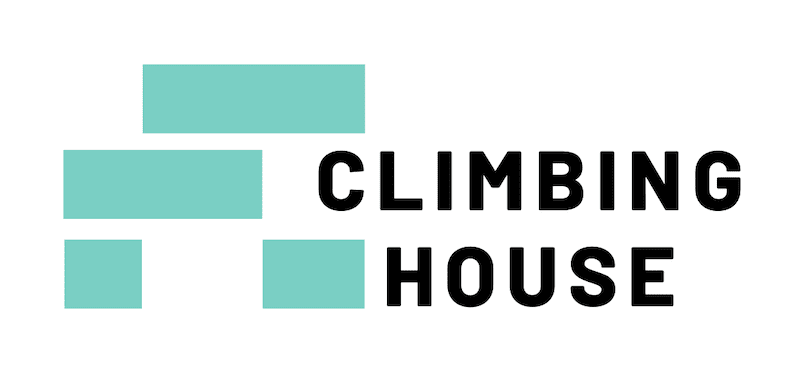Climbing Coach: How to Find a Great One (2024 Guide)

Published on: 07/30/2023
By Teddy Dondanville, AMGA
There are a lot of different ways to get better at rock climbing. You can train in the gym, watch videos on your favorite youtube channel, read articles about how to get better, listen to a climbing podcast, or sign up for a course with an instructor.
For most climbers, the preferred tactic is to rock climb more often. However, even the age-old tactic of climbing until your tips are bloodied and your forearms explode doesn’t work for everyone. For some people, hiring a climbing coach is the key to their success.
Keep reading if you recently began climbing (or have been climbing for years) and are considering how to beef up your own climbing by hiring a coach. In this article, I’ll talk about what a coach for climbing is and how they can positively impact your climbing.
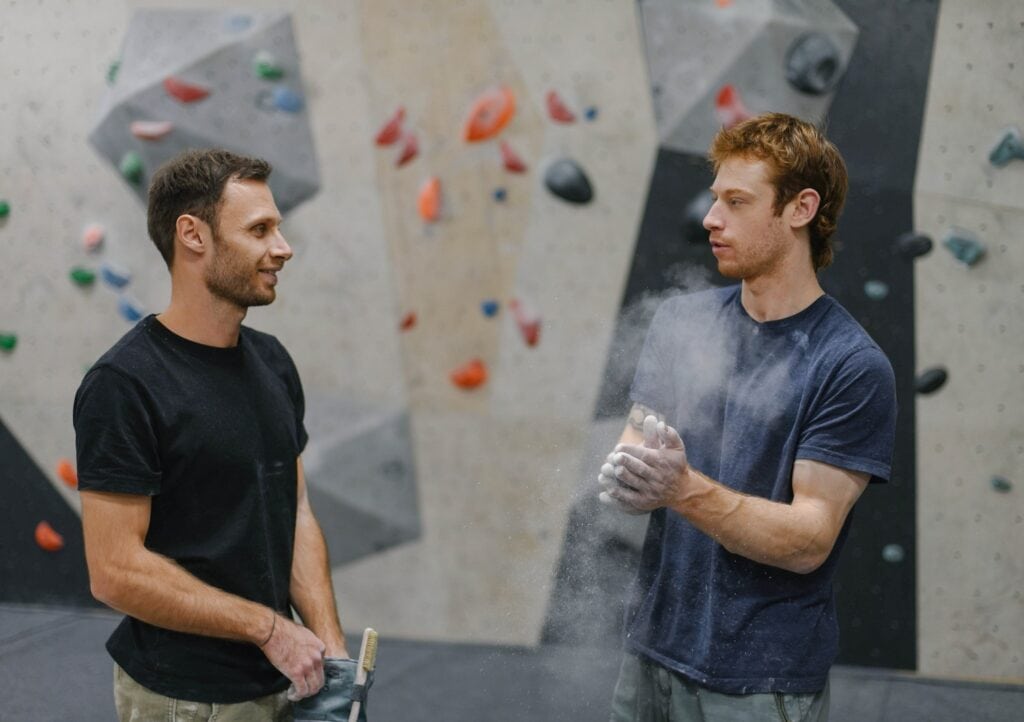
What’s a Climbing Coach?
A climbing coach is someone who has extensive knowledge in the various different components of climbing, such as strength training, climbing movement, and nutrition, and who can effectively understand your climbing goals, take stock of your strengths and weaknesses, and develop a training plan to help you improve.
The Core Responsibilities of a Coach
Every coach is different. And every relationship they have with their athlete is nuanced. But when I think of the “perfect” coach, I imagine they can perform the following responsibilities.
- Develop a plan for progression with short, medium (3-6 months), and long-term (12+ months) training plans;
- Keep you healthy through strength conditioning and injury-prevention training if you have antecedents;
- Help plan your day in the rock gym or at the crag;
- Help you learn more efficient movements and techniques;
- Improve your climbing tactics and performance strategies for competitions;
- Review and analyze your performance to look for weaknesses and areas of improvement;
- Advise you on nutrition and how you fuel your body;
- Instruct new technical skills for specific climbing disciplines, like learning to trad climb;
- Advise you on the climbing mindset and dealing with fear while climbing;
- Hold you accountable for your fitness journey, climbing goals, and training schedule.
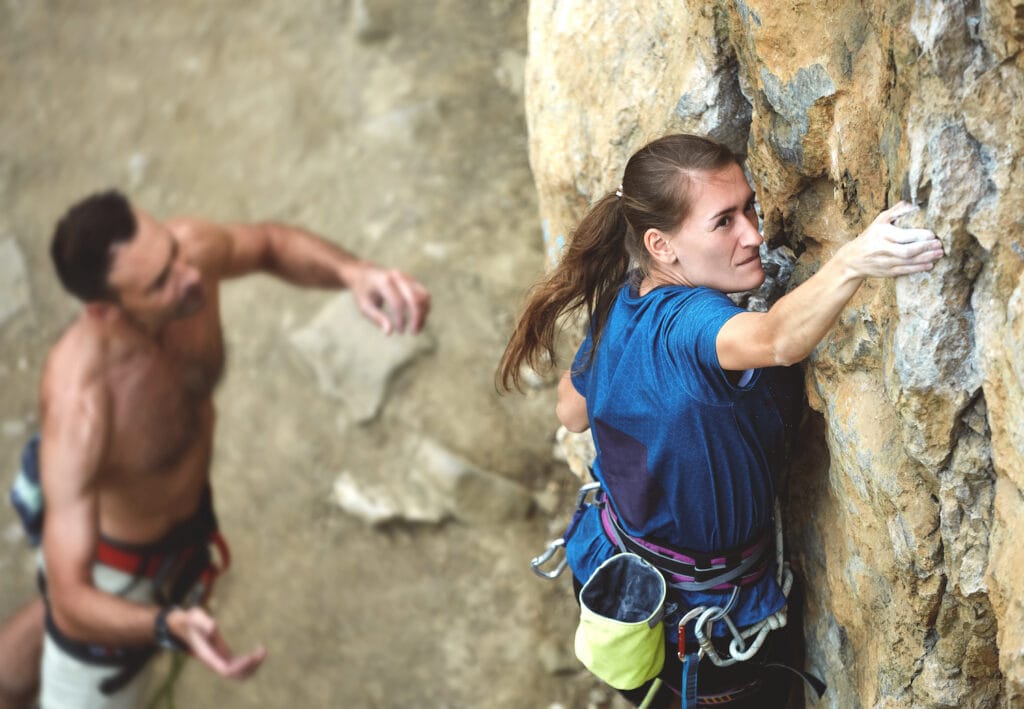
When Getting a Coach Makes Sense
There are no prerequisites for getting a coach. Most coaches will happily work with you to help you meet your goals, regardless of your background.
Therefore, deciding when you need a coach is really up to you.
Most often, climbers decide to work with a coach and implement a new training program when they reach a plateau in their climbing training.
A climbing plateau is when you reach a point in your climbing training where you stop making improvements. For example, you’ve been bouldering for a few years and are stuck in the V4-V5 range.
Coaches can help you surpass plateaus and climb harder by designing a methodical approach to helping you set climbing goals, build finger strength, prevent injuries, develop endurance, improve weaknesses, and stay committed to your training.
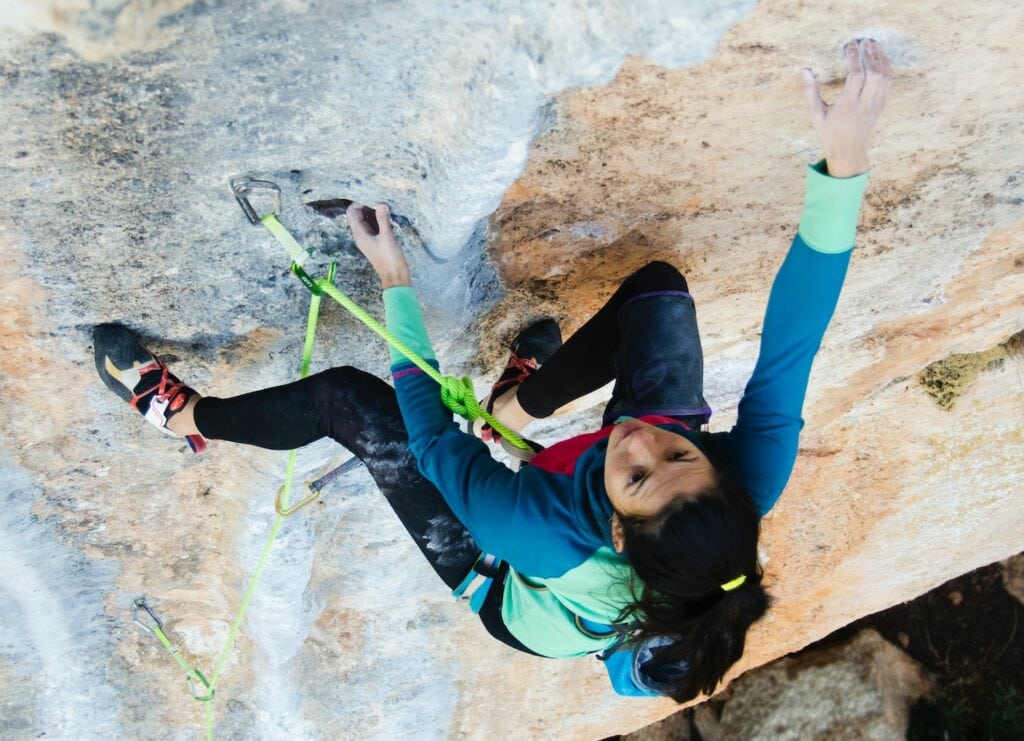
How to Find the Perfect Coach for You
Finding the right coach is an entirely personal process. Who you hire will depend on where you live, your climbing experience, the coach’s background or specialty, your goals, the time frame, and your budget (amongst other things).
Therefore, I cannot tell you who the perfect coach is for you.
However, I would like to highlight some important considerations that I learned about the climbing coaching industry that may assist you in doing your research and eventually hiring someone.
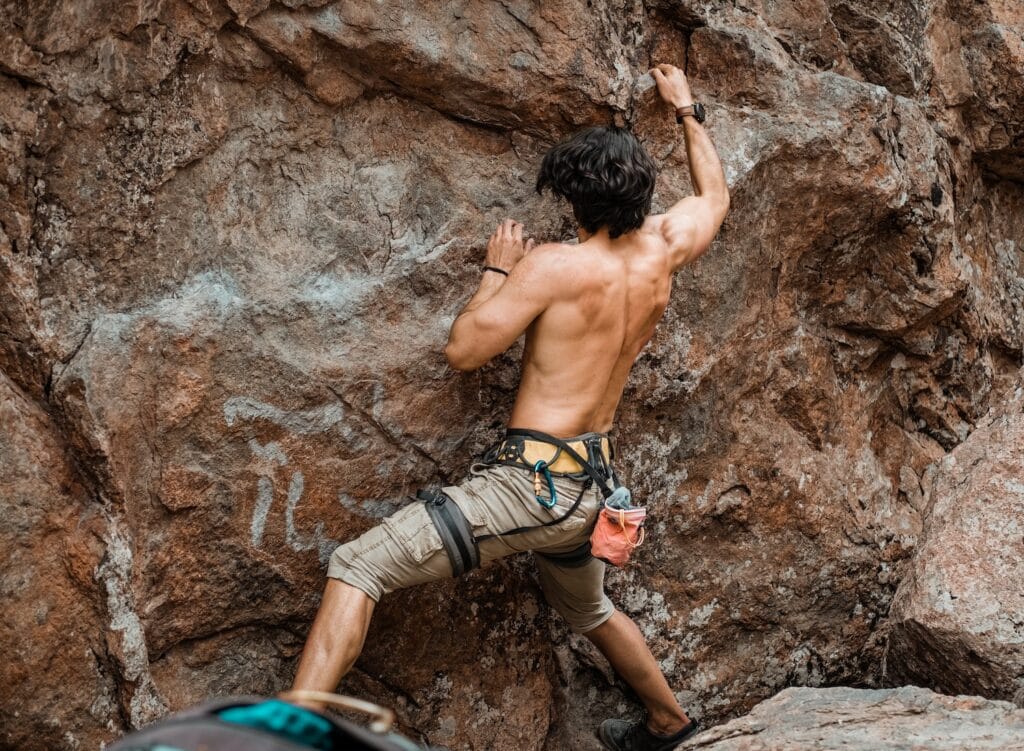
Consider What Discipline of Climbing You Want to Improve
It’s important to consider what facet of your climbing you are trying to improve. Do you want to boulder harder? Are you trying to bump up your red point grade? Or are you interested in improving your trad climbing skills?
Bouldering
Many coaches have a distinct background in bouldering. That’s because bouldering is the original training discipline for rock climbing. In other words, climbers have always used bouldering to improve their climbing, with or without a coach.
Therefore, modern-day coaches lean heavily on bouldering to train their athletes, even if the athlete primarily focuses on a different discipline, like sport climbing.
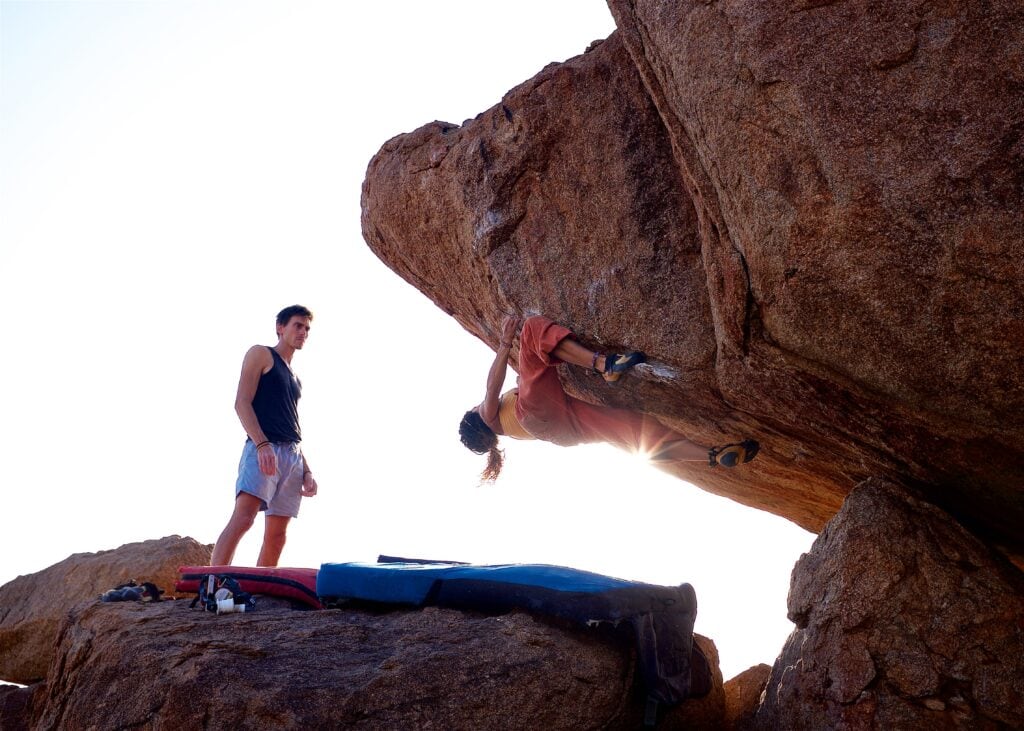
Coaches specializing in coaching bouldering help their athletes improve their contact strength, power endurance, abdominal strength (core tension), and gymnastic movement. For competition boulders, coaches train athletes to read problems, flash boulders, and perform better under time pressures.
Sport Climbing
Many climbing coaching programs focus on sport climbs. That’s because sport climbing is one of the most popular climbing disciplines. Like bouldering, you can easily practice and train inside while having a distinct outdoor climbing hobby.
Coaches specializing in sport climbing train their athletes to improve strength, endurance, fear of falling and projecting tactics. For the competition sport climber, coaches try to help with route reading techniques, remaining calm under pressure, and improvising when the original beta feels wrong.
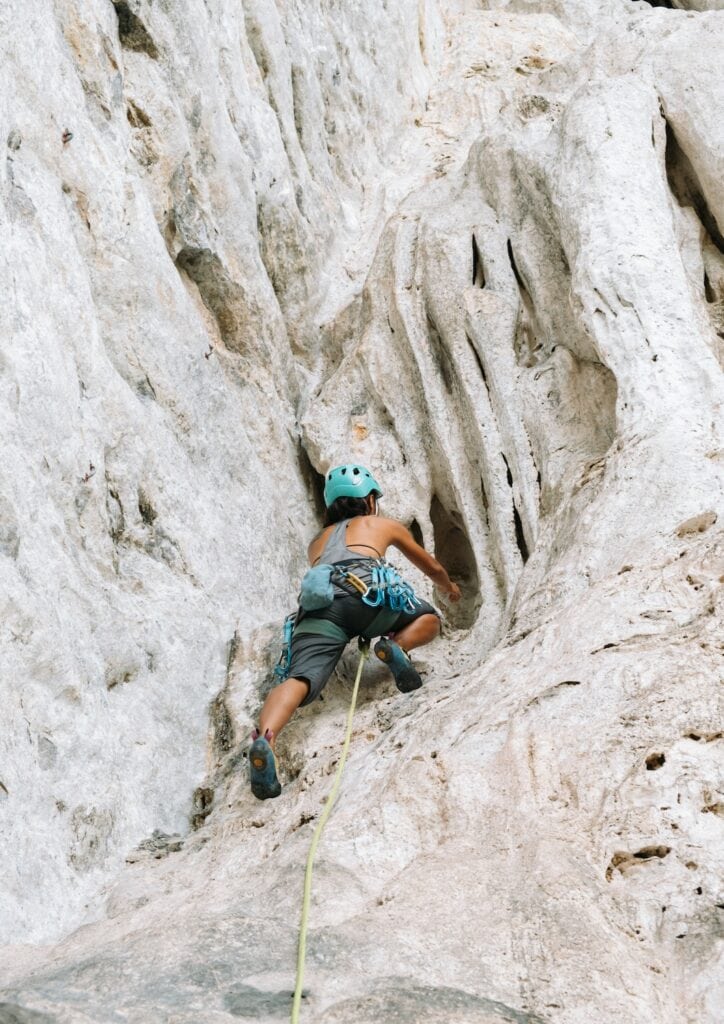
Trad Climbing
Some coaches enjoy helping climbers improve their traditional climbing. For these programs, coaches design training and coaching programs that involve learning to place gear and build anchors, decision-making and risk management, learning to trust gear, route finding, and dealing with the fear of falling.
Trad training plans also can also incorporate routines to build finger strength, avoid injury, and improve physical power and overall conditioning.
Personalized Training Plan vs. Continued Coaching
There are two primary formats for training plans for climbing. Deciding which type of format will suit you better can help point you in the right direction of finding a coach.
Personalized Training Plans
The first common type of training program is a personalized plan. With this approach, climbing coaching companies design a personalized training plan you follow independently.
They design the program based on an in-depth assessment to gauge your climbing history, current climbing training, and future goals.
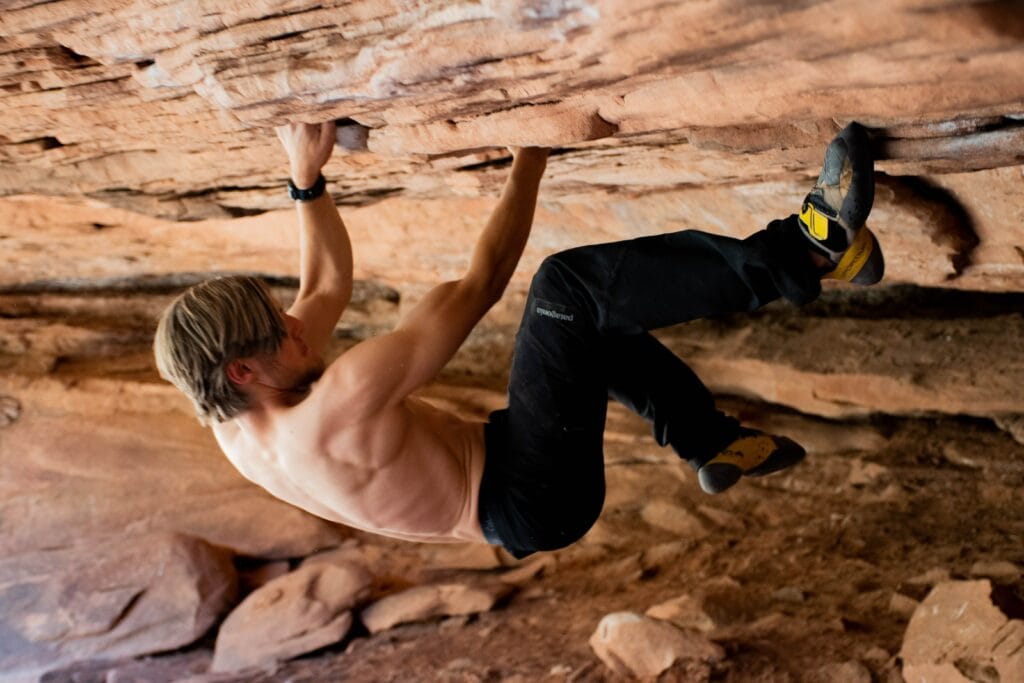
Then, with a personalized training plan, you work at your own pace and on time to complete the training sessions before you to help you grow as a climber.
Continued Coaching Regimens
The second type of training program for rock climbers is continued coaching regiments. With this approach, coaches design a personalized training plan for you and then continually work with you through the program to assess your progress, make changes, and motivate you.
There are various lengths of customized coaching regimens. The most common timeframe are either 6, 12, or 24 weeks. Although, some training programs can last longer than that.
Depending on your coaching company, your program could include in-person sessions, video calls, video analysis, email, etc. Some coaching companies also have developed their own software app you can use throughout your training cycle.
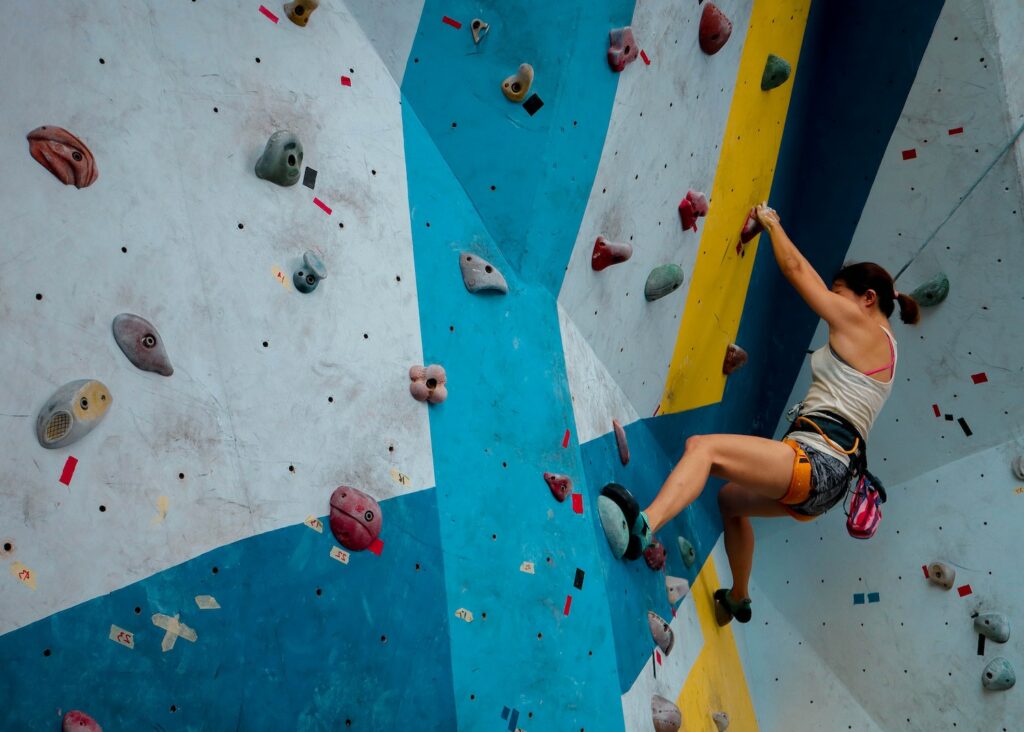
One-Size Fit All Training Plans
Some coaching companies offer pre-built training plans that you can purchase (for a lower price) designed to cater to a wider spectrum of climbers.
In other words, they have generic training plans designed to target different types of climbers and help hone specific skills.
For example, if you boulder V4 but want to get stronger and boulder V7, there are training plans you can buy that will help facilitate that. Or, if you want to improve your finger strength, you can purchase a downloadable ebook finger strength workout plan.
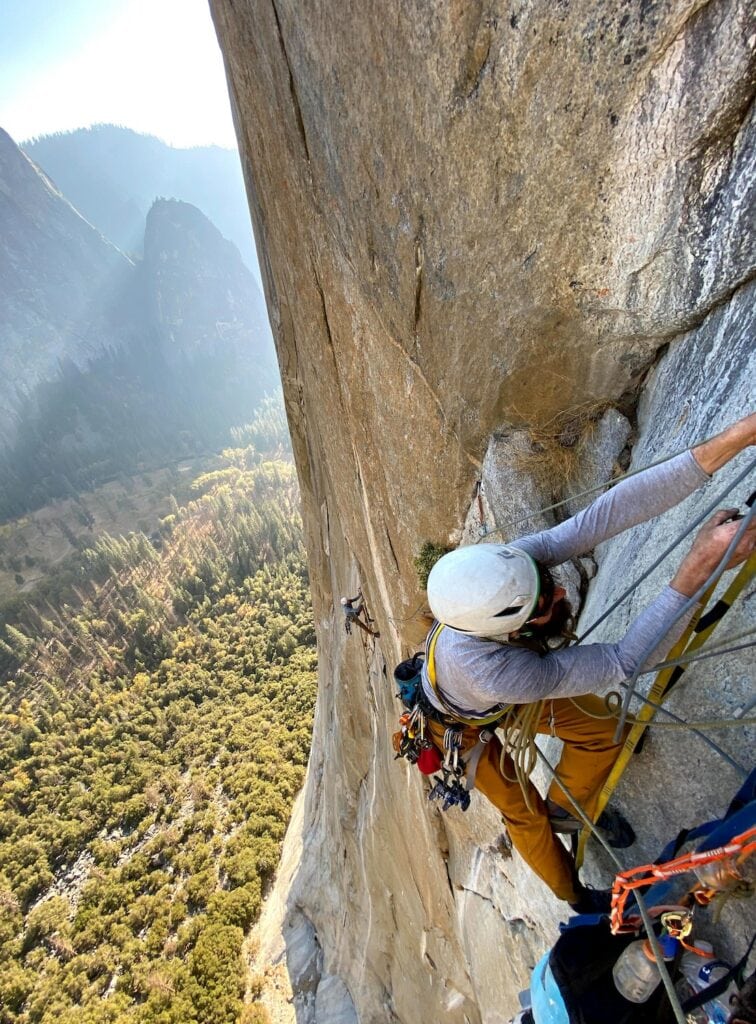
Destination-Specific Training Plans
One type of training plan that I find unique is destination-based training plans.
This type of training program is designed to help identify the unique demands of specific crags. Then, the programs help you hone specific skills, strengths, and tactics you need to send.
That way, when you arrive at your destination, you can get straight to sending and not waste any time getting used to the rock or style of climbing.
Best Places to Find a Coach
Who you end up hiring is personal. And where you look for a coach depends on where you live and what you can afford.
An obvious place to start looking for guidance is your local climbing gym. Beyond that, I would recommend consulting the internet and doing some research.
To help push you in the correct direction, I have compiled seven options selected based on the company’s vibe or coach’s background.
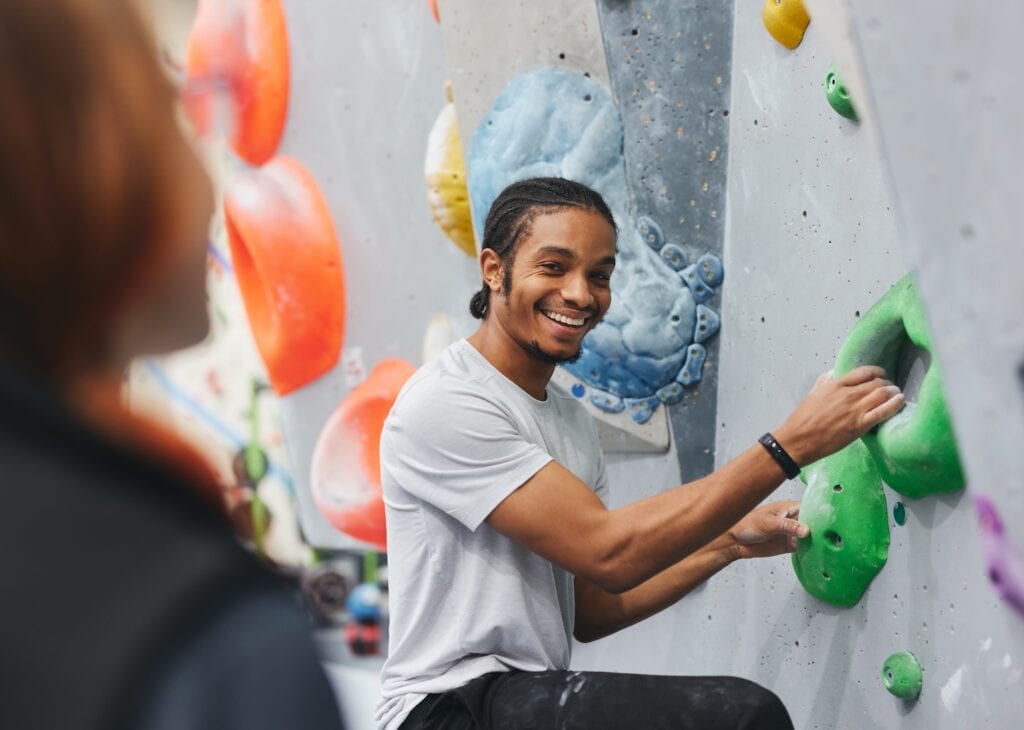
A Few Good Places to Start
- Lattice Training
- Climb Strong
- Neil Gresham
- The Power Company
- Training Beta
- Core Climber
- Testpiece Climbing
How to Vet a Coach
Vetting a potential coach is like finding a nice restaurant for a special anniversary dinner. When searching for restaurants, you want a place with an experienced chef, good reviews, and excellent food.
So for climbing coaches, you want to look for highly skilled and educated individuals with a robust history of happy and accomplished clients.
- Experience: look for a background in outdoor rock climbing.
- Expertise: look for educational experience in exercise science or a similar field.
- History: look for reviews and testimonials from past and current clientele (e.g. Google Maps reviews, Reddit, Mountain Project).
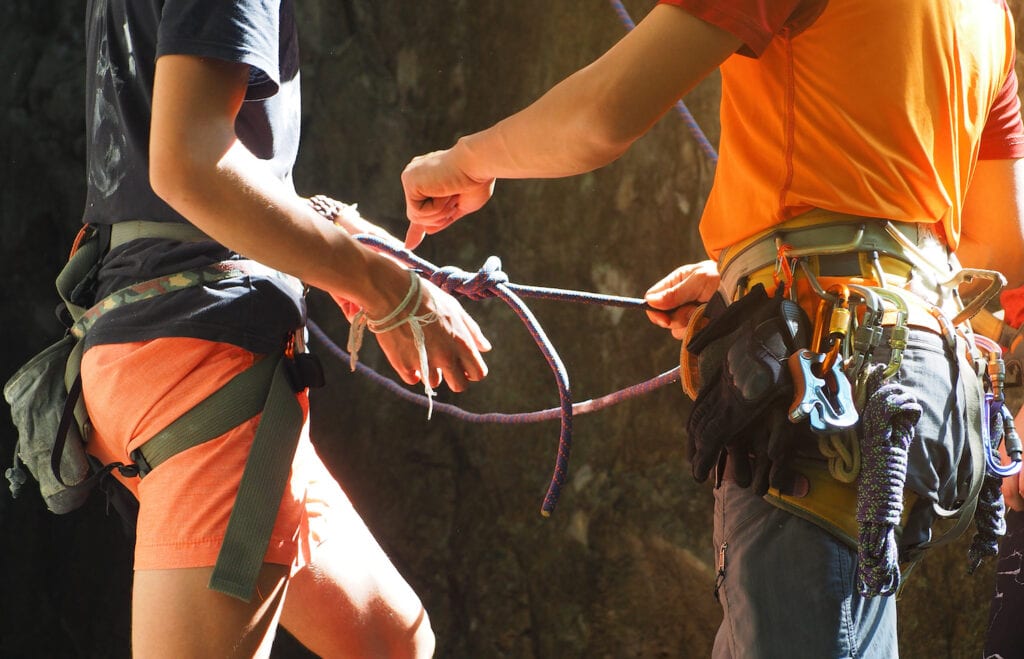
Alternatives to Climbing Coaches
Hiring a coach may not be for everyone. That could be because your budget doesn’t accommodate hiring someone to coach you. Or because you don’t have free time to commit to new training programs. Fortunately, there are other ways you can improve your training.
Climb with a More Experienced Mentor
Traditionally, climbing skills, advice, techniques, and knowledge were passed down from mentors to mentees. So whenever possible, climb with someone more experienced and absorb all the good things they do like a sponge (and ignore the sketchy “old school” stuff, like rapping off the belay loop with a third hand on the leg loop).
Sign Up for Group Courses
Rock climbing gyms are great places to sign up for group courses. Depending on what’s available at your gym, you can sign up for a group course that focuses on climbing, movement, and strength training.
Regarding learning to rock climb outside, if your local gym does not have a well-developed schedule of educational offerings, your next best option is to hire a climbing guide.
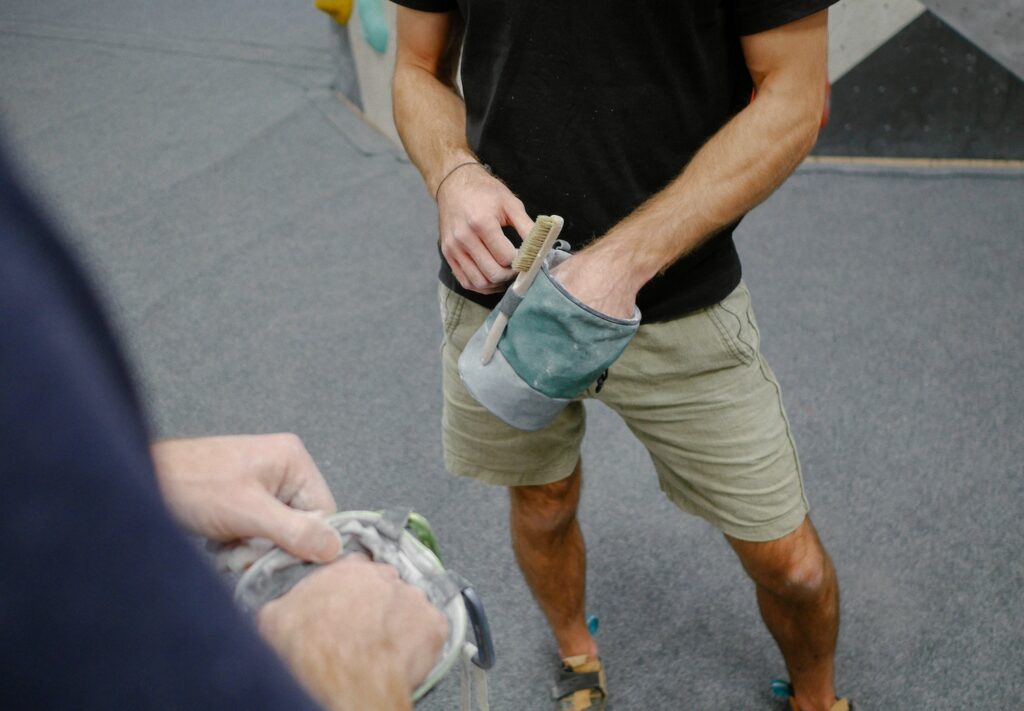
Self-Learning
Nowadays, it’s possible to educate yourself about climbing and develop your own fitness and conditioning training program.
The wealth of free information on the internet can teach even the most beginner climber how to get stronger and continue improving weaknesses as if they were getting professional advice from a trainer.
Final Thoughts
If you are stuck on a climbing plateau, where you can’t realize any gains no matter what you do, then it may be time to hire a coach.
Climbing coaches are specialists in assessing your climbing history, understanding your goals for the future, and creating a training program to help you improve.
On the other hand, if you don’t want to hire someone specifically but still want proven and professional guidance, there are tons of purchasable and downloadable training plans you can follow to improve your climbing.
Whatever you do, just remember: the best climber in the gym (or at the cag) is not the strongest. It’s the one having the most fun!
